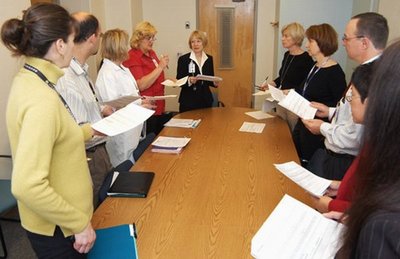November 29, 2007
Team turns up ‘HEAT’ on patient safety
Mary Guiden
News & Community Relations
UW Medical Center has always taken patient safety seriously. Leadership and staff have become increasingly committed in recent years to making UWMC the safest hospital in the United States, fueled in part by an increased interest in hospital patient safety from consumers, payers and the media. Leaders are, in fact, turning up the HEAT on patient safety.
HEAT, or the Husky Events Analysis Team, meets once a week to review “low-harm” and other categories of events reported by staff members of the hospital through its online event-reporting system. Low-harm events may be as simple as a spill on the floor that could cause a patient to fall.
The aim of HEAT — sponsored by UWMC’s Center for Clinical Excellence and adapted from a similar format used at Johns Hopkins — is to identify and implement process improvement, with the goal of improved patient care and a decrease in patient-harm events.
Some 30 events each week are discussed. “Medication errors, patient falls, miscommunication between departments, and equipment issues are just some of the many safety events that can occur in a complex hospital environment,” said Lisa Goben, patient safety information systems administrator and HEAT facilitator.
HEAT members are from a variety of departments to encourage a multidisciplinary response to events. Members include the patient care services director, patient safety officer, two risk management representatives, a patient falls clinical specialist, medication safety pharmacist, radiology operations manager, nurse manager, and a rotating senior associate medical director, who attends once a month.
But what makes the group unusual is that HEAT members meet standing up to ensure the time is used efficiently and talk is focused. “I was reluctant to add another weekly one-hour meeting to everyone’s busy schedule, unless I could keep it moving quickly and focus on the business at hand,” said Goben. “People can get a little too comfortable at times sitting down and conversations will drift off topic. When your legs start to get tired, you are less likely to chit chat,” she added. Goben got this idea from her husband, who had mentioned to her that the most successful meetings he had attended in the workplace were when co-workers met standing in a hallway.
There have been fewer patient falls in the UWMC lobby since the launch of HEAT, said Julie Duncan, director of the Center for Clinical Excellence. A new type of coating was placed on the floor to make it less sticky and easier to traverse. In another case, staff on several floors recently had difficulties reaching a first-year resident. Two of the events occurred on the same floor one day and five days later, it happened on another floor. Thanks to HEAT, Goben discovered that not all team members were listed on the monthly call schedule. “Because of that, a schedule including senior residents is now available to the paging operators and we have not seen any further complaints,” she said.
Goben and HEAT members applaud staff for reporting events that raise concerns and improve patient safety at UWMC. All concerns are continuously being addressed, Goben added. Questions about HEAT? Contact Lisa Goben at 206-598-3767.



